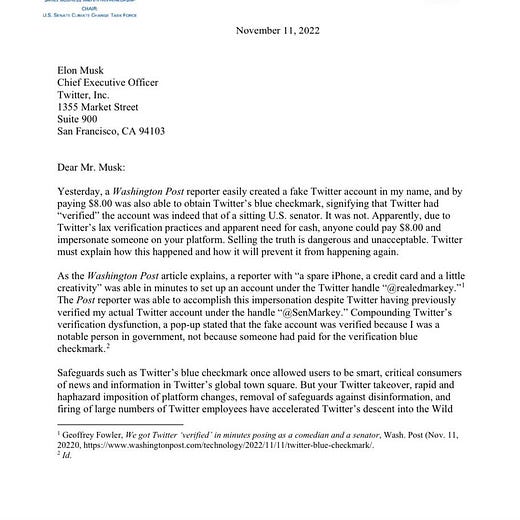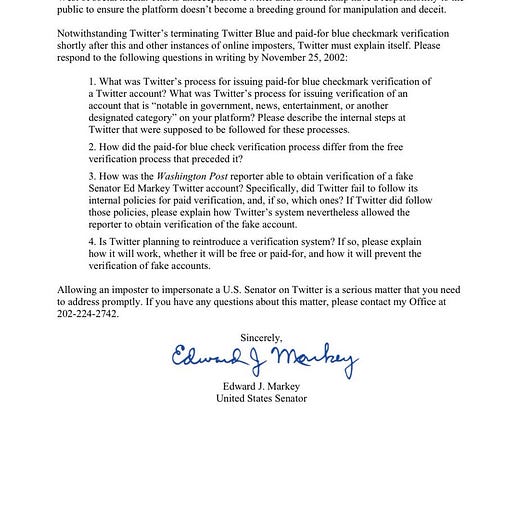Hellsite Update
It just keeps getting worse for Elon
I made some predictions last Sunday about how week 2 of Elon-Twitter would go.
The highlights (linked below) were:
(1) Twitter Blue would have an abysmal launch.
(2) the new verification system would become an attack surface for spammers and scammers.
(3) the company would do an awful job of dealing with these problems, both at an engineering level and a crisis comms level, because Elon had simply fired way too many people.
(4) Many more advertisers would pull their ads as a result.
And (5) It would also be clear that the new verified checks were just vanity tools — the user experience would be basically unchanged.
I also thought the public attention to the U.S. midterm elections would give Elon a breather. He’d have a chance to take a breather, a reset. Or maybe he’d just keep burning the place down.
My point here isn’t to claim the gift of prophecy. (Though, sure, once again, kinda nailed it.) The point is that it was pretty easy to see this terrible week coming.
Twitter Blue is a flop. The new verification system is primarily used for impersonation. Besides impersonation, it’s barely used at all. Advertisers continue to flee. Senior managers have resigned in protest. A member of the legal team warned, on the way out the door, that the company would potentially face billions in FTC fines for violation of the 2011 consent decree, and also encouraged employees to seek whistleblower protections. Elon finally held an all-staff meeting and warned that the company might go bankrupt. He also kept picking dumber and dumber fights on Twitter — real grade-school-bully antics. The guy is leaving himself no room to maneuver, no opportunity to right the ship.
Let’s look at just a few of the details.
Here’s a fun game to play at home: Who is actually paying for “verified” status?
I follow 4,936 people on Twitter. According to the “search of shame,” four of them are paying Elon Musk $8/month for status and search ranking. These include a couple of prominent crypto-critics, a longstanding parody account, and progressive political account that appears to be a full-time social media poster. They each have specific reasons why the extra money might appear worthwhile.
My hunch is that there are three or four categories of people who will pay for verified status:
-Elon fanboys, in a show of solidarity. If your favorite hobby is jumping into peoples mentions to defend your favorite tech billionaire, why not pay for a verification check that helps you annoy your targets?
-Cryptocurrency enthusiasts. (this category might subsume the Elon fanboy category.) The best way to make money from crypto is to run scams. Successful scams are very lucrative. For eight bucks a month, your scams can look marginally more believable to your marks. That’s a solid value proposition.
-Professional twitter-users. Ryan Broderick makes this point in the latest episode of his podcast, The Content Mines. Broderick writes the Garbage Day Substack. He estimates that Twitter referrals are worth more than $8/month from the new subscriptions they generate. Even though he hates what Musk is doing to the site, when/if Elon removes legacy verification for journalists, he’ll fork over the cash. (If I was running a paid Substack, I'd run the numbers and make the same calculation.)
-Parody accounts, spending $8 on a joke so they can go out in a blaze of glory. I made this point last week. If I wanted to go out in a blaze of glory, I could spend 8 bucks, change my handle to “Bret Stephens,” and enjoy a few hours of tomfoolery before getting my account suspended. (I’m not going to do it. But the point is that you don’t have to think very hard to come up with these sort of use cases. There are a lot of people on the internet who are both funnier and more chaotic than I am. Of course this was going to happen.)
The wreckage has been glorious so far. Sam Thielman (below) compiled a list of some of the best brand-imitation tweets. The best was probably the fake Eli Lilly tweet, announcing that insulin would be free. The company’s stock took a hit when they issued a correction. Posting really is praxis now, I guess.
But it has also been a catastrophic business strategy. According to the New York Times, only 140,000 of Twitter’s 240 million users have signed up for the new subscription service so far. That’s about a million dollars in revenue per month, $12 million per year. Elon has to add an extra billion in revenue just to service the debt he added to the company while acquiring it. Even worse, major advertisers have reacted to the chaos by pausing their ad buys, costing the company billions. Someone check my math, but I’m pretty sure adding millions in new revenue while subtracting billions in lost revenue is the type of bold business move that leads to chapter 11 bankruptcy.
(And you don’t have to take my word for it. Elon is already warning that the company might go bankrupt.)
The deeper problems are yet to come.
The fake verified accounts we’ve seen so far are just the entertaining tip of the iceberg. These are the fake accounts that WANT to be found. We aren’t seeing the more dangerous stuff yet. Twitter has become an attack surface for hacks, malware, identity theft, etc. Those stories will come out later. They will have serious costs.
Here’s a prediction: after some of those stories come out, there will be lawsuits. The plaintiff will claim that Twitter knew that these fake verified accounts were causing serious harm, and did nothing to stop it because the company was making money off the process. Twitter’s lawyers will be tasked with explaining away Elon’s tweets, where he confirms this to be exactly the case. (I pity the poor twitter lawyer who has to make that argument.)
Here’s another prediction: Twitter is going to face over a billion in fines from the Federal Trade Commission. Twitter has operated under a consent decree since 2011. Legally, the company cannot make major changes without approval. Elon wants the company to be in startup-mode. He wants to move fast and break things, for everyone to be “hardcore.” He wants to iterate fast and “do lots of dumb things.. keep what works & change what doesn’t.”
There are obvious reasons why huge platforms like Twitter can’t just recapture that exciting, scrappy startup vibe. Startups don’t operate under consent decrees from a watchful FTC based on settlements from major mistakes the made a decade ago. Startups aren’t so large that they do serious damage to established brands based on dumb trial-and-error mistakes. They don’t have established business models that can get wrecked while “doing dumb things.”
And here’s one final prediction: somehow, week 3 is going to go even worse for Musk-Twitter than week 2 did.
Just today, Casey Newton (who, sidebar, has been on FIRE lately) reported that Twitter has laid off 80% of its contract employees. That's most of the content moderation support. When something goes wrong for the company, it's going to go really wrong.
My hunch is that Elon has a pretty simple, ultimately self-defeating plan here. He has bragged repeatedly that Twitter usage is breaking records. It is probably not a coincidence that, immediately after he fired the people who were deleting ~1 million bot accounts per day, the user numbers started growing faster. If you stop erasing bot accounts, your vanity metrics will look better even as the user experience falls to shit. Now he’s doubling down, firing the people who are charged with suspending scammers and hate brigades. That will boost the usage numbers some more while degrading the user experience. And the worse the unverified user experience becomes, the stronger the case will be for buying the $8 premium version!
I don’t think that will go well at all. But I wouldn’t be the least bit surprised to learn Elon and his buddies had bought into it.
Meanwhile, also today, Senator Ed Markey raised major concerns about the holes in Twitter’s new verification system.
Elon replied with the following:
Musk has picked these fights with Democratic Senators on Twitter in the past. But that was back when he was the electric car billionaire, using his favorite medium to shitpost Senators when they called for taxing billionaires.
The Democratic Party is going to have the Senate majority next year. Ed Markey sits on all the relevant oversight committees for social media companies. And he is raising serious questions about Twitter empowering malicious actors to impersonate government officials.
Elon is signing himself up to live the experience of being a social media CEO called before Congress to explain his dumbfuckery.
It's going to go poorly for him. Because he is very, very bad at this job.
These are all obvious errors. Elon doesn’t have some grand plan for how to fix Twitter by breaking it. He isn’t in league with a shadowy cabal that plans to ruin Twitter to further their own agenda. He’s just bad at this.
He’s still like a tilting gambler, throwing good money after bad. But what has become clear is just how incapable he is of seeing one or two steps ahead.
Things are going to keep getting worse for Elon’s Twitter, because of course they are. If you don’t want your investment to burn to the ground, don’t pour gasoline on the server banks while you disable the fire alarms.










I keep waiting for some action that convinces me that they really know what they are doing.
I am beginning to think that Elon is not a chess player. As you mentioned he seem unable to look 2 moves ahead.
I watch this from the sidelines with a mixture of horror and amazement. As a product manager, I have spent more than 20 years trying to avoid this sort of chaos, and now I can see what happens if good people aren't at the critical points in the organization.
I am going to need Costco quantities of popcorn for this shit-show